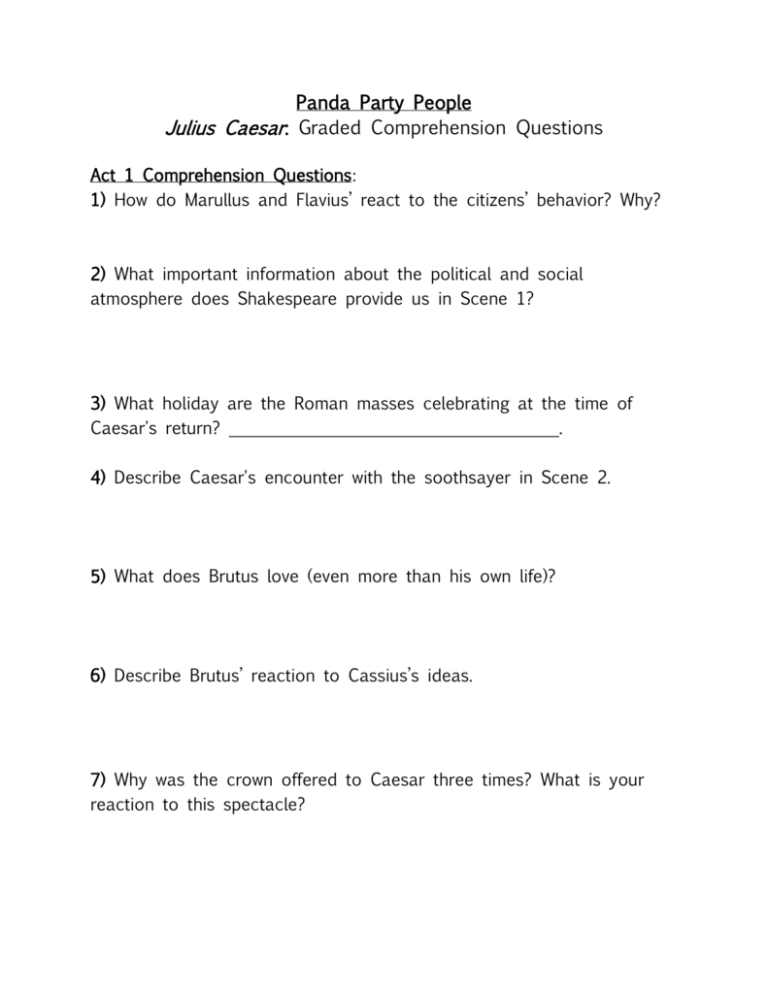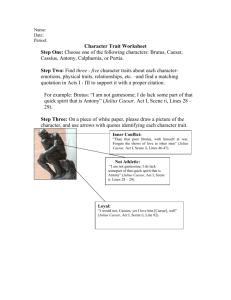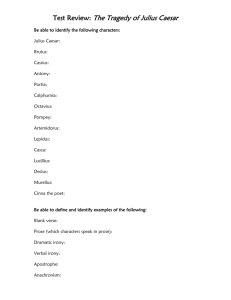Panda Party People Julius Caesar: Graded Comprehension
advertisement

Panda Party People Julius Caesar: Graded Comprehension Questions Act 1 Comprehension Questions: 1) How do Marullus and Flavius’ react to the citizens’ behavior? Why? 2) What important information about the political and social atmosphere does Shakespeare provide us in Scene 1? 3) What holiday are the Roman masses celebrating at the time of Caesar's return? _______________________________________. 4) Describe Caesar's encounter with the soothsayer in Scene 2. 5) What does Brutus love (even more than his own life)? 6) Describe Brutus’ reaction to Cassius’s ideas. 7) Why was the crown offered to Caesar three times? What is your reaction to this spectacle? 8) The phrase “It’s all Greek to me” has become a common idiom. This saying comes from Casca’s line, “…but for my own part, it was Greek to me,” which originates from the Medieval Latin proverb Graecum est; non protest legi, meaning, “It is Greek; it cannot be read.” Explain how Casca’s line is ironic. 9) How does Cassius plan to trick Brutus into joining the conspirators? 10) How does the weather at the start of Scene 3 contribute to the mood and how is the mood significant? Act 2 Comprehension Questions: 1) To what does Brutus compare Caesar? Why does Brutus now feel that he must kill Caesar immediately? 2) Why does Brutus insist that men do not need an oath? 3) Who does Cassius want to murder in addition to Caesar? How does Brutus react to this suggestion? 4) How does Portia prove she is worthy to hear the plans of her husband, Brutus? 5) An anachronism is when an author unknowingly or purposefully inserts something from a different period of time into his or her writing. Shakespeare uses an anachronism in this scene. See if you can find it. Why do you think Shakespeare might have used this anachronism? 6) After an ominous dream, Calpurnia begs Caesar to stay away from the senate and, at first, he agrees; however, what changes his mind? 7) Caesar instructs his men to keep close to him. What is the irony? 8) Artemidorus reads from a letter at the start of Scene 3. Who wrote it? What does Artemidorus plan to do with it? Act 3 Comprehension Questions: 1) What is the significance of Caesar's dying words, "Et tu, Brute? Then fall, Caesar!"? 2) What message does Antony send to Brutus and what does he request? 3) In his soliloquy, what does Antony vow? 4) Describe the main argument Brutus makes to Roman people about Caesar’s death at his funeral. How does this make the citizens feel about him and about Caesar? 5) Who turns the people of Rome against Brutus and how does he do it? 6) What happens to Cinna and who do the citizens mistake him for? 7) This scene is often seem as providing comic relief. Why do you think Shakespeare included this here? Act 4 Comprehension Questions: 1) How has Brutus been feeling about Cassius lately? 2) Why does Cassius take out his dagger and on whom does he blame his temper? 3) What has happened to Portia? How did this happen? 4) What does Brutus ask Lucius to do for him? What happens to Lucius? 5) Describe the encounter between Brutus and Caesar's ghost. Act 5 Comprehension Questions: 1) How does Octavius contradict Antony early in Scene 1? 2) Why are Cassius and Brutus so worried now? 3) How does Caesar finally get his revenge against Cassius? 4) Explain the significance of Antony's final speech, beginning with the line, "This was the noblest Roman of them all" (5.5.68).



